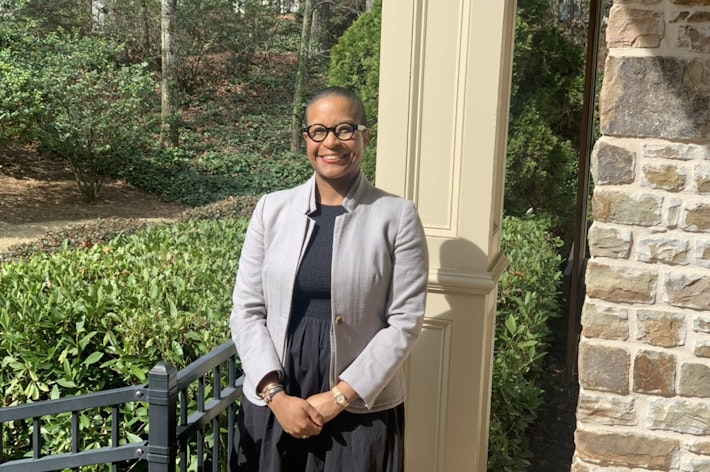Centered on Civil Rights: Tomiko Brown-Nagin
The struggle for civil rights has been at the center of Radcliffe Institute Dean Tomiko Brown-Nagin’s scholarly work.
She was born in Edgefield County, South Carolina, also the birthplace of Strom Thurmond, a politician whom Tomiko Brown-Nagin, with characteristic understatement, describes as “resistant to racial change.” Thurmond personified the South’s commitment to Jim Crow. The congressman helped draft the Southern Manifesto—a statement in defiance of Brown v. Board of Education and a promise to thwart school desegregation—staged a record-breaking 24-hour filibuster of the Civil Rights Act of 1957, and vociferously opposed the Civil Rights Act of 1964. The landmark 1964 law, enacted just a few years before Brown-Nagin’s birth, banned racial discrimination in schools, public accommodations, and employment.
Brown-Nagin’s life has paralleled the civil rights movement. Her parents attended segregated schools. And her father, like most African Americans of his era, didn’t have the opportunity to attend college; she went to integrated schools and had the best education America provides: a doctoral degree from Duke, a law degree from Yale, a bachelor’s degree from Furman University, summa cum laude and Phi Beta Kappa. “I don’t think it’s a coincidence that I grew up with history very present and later became a civil rights historian,” Brown-Nagin says. “My father knew what he had not had, and he encouraged me to go out and get it. Because my growing up happened to coincide with the changes of the civil rights era, I was able to do precisely that."
The struggle for civil rights has been at the center of Brown-Nagin’s scholarly work. In her first book, Courage to Dissent: Atlanta and the Long History of the Civil Rights Movement (Oxford University Press, 2011)—which began as her dissertation at Duke—she explored the fight for civil rights in Atlanta from the bottom up, from the perspective of local people and the lawyers who represented them in court. Her approach earned her the Bancroft Prize, one of the most prestigious awards in the field of history, and a raft of other accolades.
Brown-Nagin is one of her generation’s finest legal historians and also writes and publishes about constitutional law, education law and policy, and law and social change. Brown-Nagin joined the faculty of Harvard Law School and of the Harvard history department in 2012 from the University of Virginia. Prior to becoming an academic, Brown-Nagin worked for two years as a litigation associate at a prominent law firm in New York City.
Brown-Nagin’s current book project revisits her interest in law and social change through the lens of biography. As she worked on Courage to Dissent, Brown-Nagin became especially interested in Constance Baker Motley, an African American attorney who was mentored by Thurgood Marshall and litigated numerous landmark civil rights cases, including Brown v. Board of Education. While Marshall attained fame, Constance Baker Motley is not nearly as well-known. With her new book, Brown-Nagin seeks to make Motley a more familiar name and to explore how culture and identity shape professional life. Brown-Nagin worked on her Motley biography while she was Radcliffe’s 2016–2017 Joy Foundation Fellow and conducted research for the book at Radcliffe’s Schlesinger Library. Currently titled The Civil Rights Queen: Constance Baker Motley and Struggles for Equality, the book is slated for publication in 2020 by Pantheon Press.
While serving as dean of the Radcliffe Institute, Brown-Nagin maintains her two other affiliations with the University—as the Daniel P.S. Paul Professor of Constitutional Law at Harvard Law School and as a professor of history in the Faculty of Arts and Sciences—but will reduce her commitments there. “I love teaching,” she says. “I find being a mentor to students valuable and joyful. I look forward to continuing this work, though certainly not in the same capacity. I’m not going to be teaching a large constitutional law course, which I’ve done in the past.”
At Harvard Law School, Brown-Nagin was the faculty director of the Charles Hamilton Houston Institute for Race & Justice and codirector of HLS’s Program in Law and History. She also served as a member of the University’s Task Force on the Prevention of Sexual Assault and as a member of the search committee for the director of the Radcliffe Institute’s Schlesinger Library.
As Radcliffe’s dean, Brown-Nagin will also play an important role across Harvard. “I’m very much interested in the challenges that face the University and all of higher education,” she says. “I’ve written about issues in higher education, including college access and college success, and I’m delighted to continue to be involved in those endeavors.”
When she’s not busy leading the Radcliffe Institute, teaching, mentoring, and writing books and articles, Brown-Nagin spends time with her family. She and her husband, Daniel Nagin—who is clinical professor of law, vice dean for experiential learning and clinical legal education, and faculty director of the WilmerHale Legal Services Center and Veterans Clinic at Harvard Law School—have two sons, Julius and Avi.
“We like to go out to dinner,” Brown-Nagin says. “We love jazz, so we go to concerts here and outside Boston.” Favorite musicians? John Coltrane and Miles Davis, and Wynton Marsalis.
“One other thing,” Brown-Nagin adds. “We really like sports. I spend a tremendous amount of time attending my kids’ games: soccer, basketball, track and field. And we go to Celtics games. We definitely find ways to have fun. Having fun is really important.”







